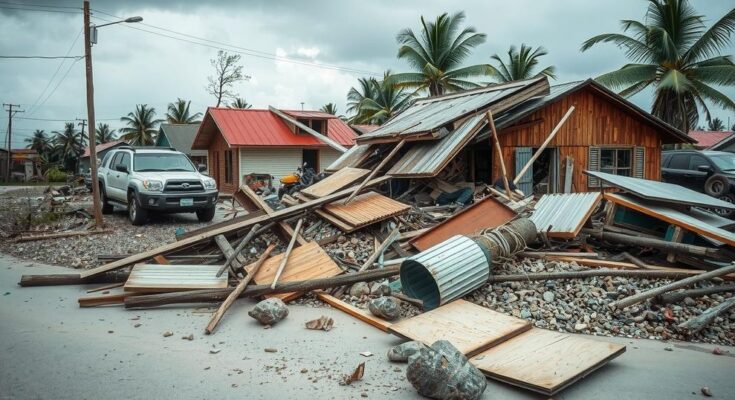Cyclone Chido has resulted in 34 fatalities and extensive destruction in Mozambique, particularly in Nampula and Niassa provinces. Thousands have been displaced with urgent needs for aid as the cyclone continues to impact the region with heavy rains. Relief efforts are underway to assist affected families, especially children, amidst already challenging conditions due to conflict and vulnerability.
Cyclone Chido has tragically claimed the lives of at least 34 individuals in Mozambique, as reported by the National Institute of Risk and Disaster Management. This devastating storm made landfall earlier in the week, resulting in significant destruction of infrastructure, displacing thousands, and damaging homes and roads. The initial fatalities were reported in Nampula province where the cyclone first struck, with additional casualties in Niassa province and severe injuries reported among the population.
While Chido’s intensity has decreased, it continues to impact several provinces, including Tete and Niassa, with residual heavy rains and strong winds creating ongoing hazards. Luisa Meque, President of the National Institute for Disaster Risk Management and Reduction, highlighted the necessity for community vigilance and adherence to safety measures as relief efforts are mobilized. Despite being downgraded to a severe storm, the cyclone’s remnants pose threats to 175,000 people while exacerbating vulnerabilities in a region already afflicted by conflict and underdevelopment.
The United Nations Children’s Fund (UNICEF) has indicated rising distress amongst children and families due to the cyclone’s aftermath. With widespread damage—nearly 23,600 homes and 170 fishing boats obliterated—efforts for relief and recovery are imperative. Forecasts predict that Chido will dissipate near Zimbabwe after impacting Malawi, with fears of further loss of life being echoed by humanitarian agencies. This catastrophe illustrates the ongoing challenges faced by susceptible communities in northern Mozambique as they resiliently contend with natural disasters.
Cyclone Chido struck Mozambique, a region frequently exposed to tropical cyclones, which poses compounded challenges for local populations characterized by pre-existing conflict and socio-economic vulnerabilities. The storm hit on a Sunday, impacting critical areas of the northern provinces, worsening already precarious living conditions. Amidst these adverse impacts, relief efforts commenced amidst the cyclone’s movement towards neighboring Malawi and potential dissipation near Zimbabwe.
The harrowing effects of Cyclone Chido underline the ongoing risks faced by vulnerable populations in Mozambique, particularly children and families. As the storm continues to pose threats, ongoing efforts for awareness, precaution, and external assistance are critical for recovery and support. The cyclone not only emphasizes the vulnerability of communities in southern Africa but also calls for concerted humanitarian responses to mitigate suffering and facilitate rebuilding efforts.
Original Source: www.rfi.fr




